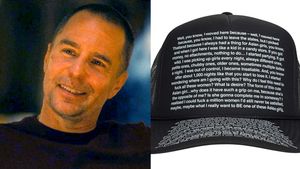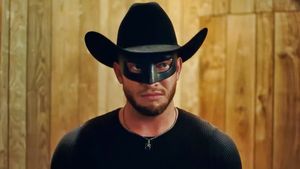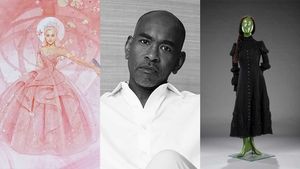
CONTACTAbout UsCAREER OPPORTUNITIESADVERTISE WITH USPRIVACY POLICYPRIVACY PREFERENCESTERMS OF USELEGAL NOTICE
© 2025 Pride Publishing Inc.
All Rights reserved
All Rights reserved
By continuing to use our site, you agree to our Private Policy and Terms of Use.
Bernice King, the youngest child of Coretta Scott King, has declined an offer to become president of the Southern Christian Leadership Conference by stating that her vision did not align with the board's and that she would begin to focus her time and energies on developing her mother's legacy. Her explanation is curious, though, because her vision also does not align with a significant part of her mother's legacy -- an unwavering commitment to advancing gay rights.
Mrs. King died five years ago this week, and the gay rights movement has missed her ever since. For more than 20 years, Mrs. King offered public support for gay rights and sought to link the modern civil rights movement -- and her husband's legacy -- with the gay rights movement. In 1983, for example, she made sure to include a lesbian speaker, the poet Audre Lorde, at the national march marking the 20th anniversary of the historic 1963 March on Washington for Jobs and Freedom. And just before the march, Mrs. King had publicly announced her full support for a federal gay rights bill.
After the shocking 1986 Supreme Court decision in Bowers v. Hardwick, which denied that gays had a constitutional right to engage in "acts of consensual sodomy," Mrs. King increasingly added her crystal-clear voice to campaigns waged by gay rights organizations and gay-friendly legislators. In 1993 she held a press conference urging President Clinton to strike down the ban on gays and lesbians serving openly in the U.S. military. A year later she stood shoulder to shoulder with Ted Kennedy and Barney Frank as they introduced legislation that would have criminalized workplace discrimination against gays. And in 2004 she publicly denounced President George W. Bush's calls for a constitutional amendment that would have effectively banned gay marriage.
All the while Mrs. King remained firmly convinced that her husband would have supported her campaign for gay rights. She frequently cited his claim that "justice is indivisible" and often noted that by fighting for gay rights she was simply helping to build the "beloved community of Martin Luther King Jr.'s dream, where all people can live together in a spirit of trust and understanding, harmony, love, and peace."
Bernice King is not her mother's daughter.
In December 2004, King joined Bishop Eddie Long -- who is now facing lawsuits alleging that he used his riches and episcopal authority to lure young men into sexual encounters -- in leading a march that opposed gay marriage. Just months before the march, which started at the King Center in Atlanta, she announced, "I know deep down in my sanctified soul that [Dr. King] did not take a bullet for same-sex unions." And nearly a decade earlier she had decried "men who accept homosexuality as an alternative lifestyle."
Unfortunately, there is not a shred of evidence that she will change her views anytime soon. On the contrary, King seems to be standing by her public statement that her views and vision line up with Bishop Long's and that he is the rightful heir to her father's legacy.
Long, who has mocked effeminate men from his pulpit, refers to homosexuality as "spiritual abortion" and preaches that God stands ready to "take out" gays who do not give up their sexual lifestyle. Like the bishop, King adopts a conservative approach to the Bible on matters of homosexuality and allows biblical verses that condemn homosexual sex to be her primary moral authority when assessing homosexuality and gay rights.
That
type of conservative approach to the Bible was utterly foreign to both
Martin Luther King Jr., and Coretta Scott King. Biblical support for
slavery alone made them wary of an uncritical approach to the Bible and
consequently they invoked other moral authorities, like the Bill of
Rights, when inviting us to dream about the beloved community.
Bernice
King has yet to follow. Doing so would require very difficult steps --
rethinking conservative biblicism and seeing Bishop Long as standing far
outside the tradition of her parents' liberal Christianity, with its
critical approach to the Bible. But until that happens, Reverend King will
never grasp, let alone advance, the inclusive legacy of her mother's
warm welcome to gays long denied entrance to the beloved community. It
was -- and is -- a legacy of love without boundaries.
Michael G. Long is the editor of Marshalling Justice: The Early Civil Rights Letters of Thurgood Marshall (Amistad/HarperCollins).
From our Sponsors
Most Popular
31 Period Films of Lesbians and Bi Women in Love That Will Take You Back
December 09 2024 1:00 PM
18 of the most batsh*t things N.C. Republican governor candidate Mark Robinson has said
October 30 2024 11:06 AM
True
These 15 major companies caved to the far right and stopped DEI programs
January 24 2025 1:11 PM
True
Latest Stories
Judge reinstates nationwide stop to Trump’s trans military ban
March 26 2025 7:07 PM
Ask Auntie: Reflecting on my trans journey toward visibility
March 26 2025 7:00 AM
Hungarians protest Pride ban; Budapest mayor promises LGBTQ+ support
March 27 2025 5:00 AM
New texts reveal Trump’s MAGA children were playing war games on their phones
March 26 2025 6:36 AM
Illinois Gov. Pritzker stands up for LGBTQ+ community in fiery HRC speech
March 25 2025 3:40 PM
Childless cat ladies in Greenland, beware: JD Vance is on his way
March 27 2025 6:00 AM
Missing gay Arizona yoga instructor, Marcus Freiberger, found dead after blind date
March 26 2025 8:50 PM
Trump executive order targets law firm challenging anti-trans policies
March 26 2025 12:13 PM
Transgender Texans refuse to be erased as Republicans try to make their existence illegal
March 26 2025 7:17 AM
True











































































